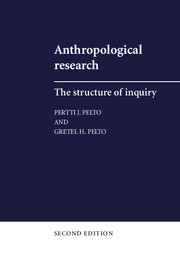Book contents
- Frontmatter
- Contents
- Preface to second edition
- Preface to first edition
- 1 The domain of methodology
- 2 Science and anthropology
- 3 Operationalism in anthropological research
- 4 Units of observation: emic and etic approaches
- 5 Tools of research – I
- 6 Tools of research – II: nonverbal techniques
- 7 Counting and sampling
- 8 Measurement, scales, and statistics
- 9 Art and science in field work
- 10 Research methods, relevance, and applied anthropology
- 11 Building anthropological theory: methods and models
- Appendixes
- Bibliography
- Index
4 - Units of observation: emic and etic approaches
Published online by Cambridge University Press: 05 June 2012
- Frontmatter
- Contents
- Preface to second edition
- Preface to first edition
- 1 The domain of methodology
- 2 Science and anthropology
- 3 Operationalism in anthropological research
- 4 Units of observation: emic and etic approaches
- 5 Tools of research – I
- 6 Tools of research – II: nonverbal techniques
- 7 Counting and sampling
- 8 Measurement, scales, and statistics
- 9 Art and science in field work
- 10 Research methods, relevance, and applied anthropology
- 11 Building anthropological theory: methods and models
- Appendixes
- Bibliography
- Index
Summary
In anthropology we want our concepts to be useful in the construction of more and more inclusive and successful theoretical systems. The success of both concepts and broader theoretical structures is measured in terms of their efficacy in explaining human behavior. In recent years there has been a growing feeling among anthropologists that our science has been progressing too slowly toward successful explanation of human behavior. As a result, critical attention has been focused on aspects of anthropological method.
One diagnosis that has been offered for the theoretical and methodological crisis in anthropology is that our problems grow out of a particular kind of weakness in the strategy of conceptualization used in most ethnographic descriptions. According to this view, cultural behavior should always be studied and categorized in terms of the inside view – the actors' definition – of human events. That is, the units of conceptualization in anthropological theories should be “discovered” by analyzing the cognitive processes of the people studied, rather than “imposed” from cross-cultural (hence ethnocentric) classifications of behavior. This point of view has been variously referred to as “the New Ethnography,” “ethnoscience,” or “ethnosemantics.”
The contrast between ethnosemantics and other anthropological methodologies has often been expressed as the opposition between “emic” and “etic” approaches to classification. The terms appear to have been coined by Kenneth Pike.
- Type
- Chapter
- Information
- Anthropological ResearchThe Structure of Inquiry, pp. 54 - 66Publisher: Cambridge University PressPrint publication year: 1978
- 2
- Cited by

